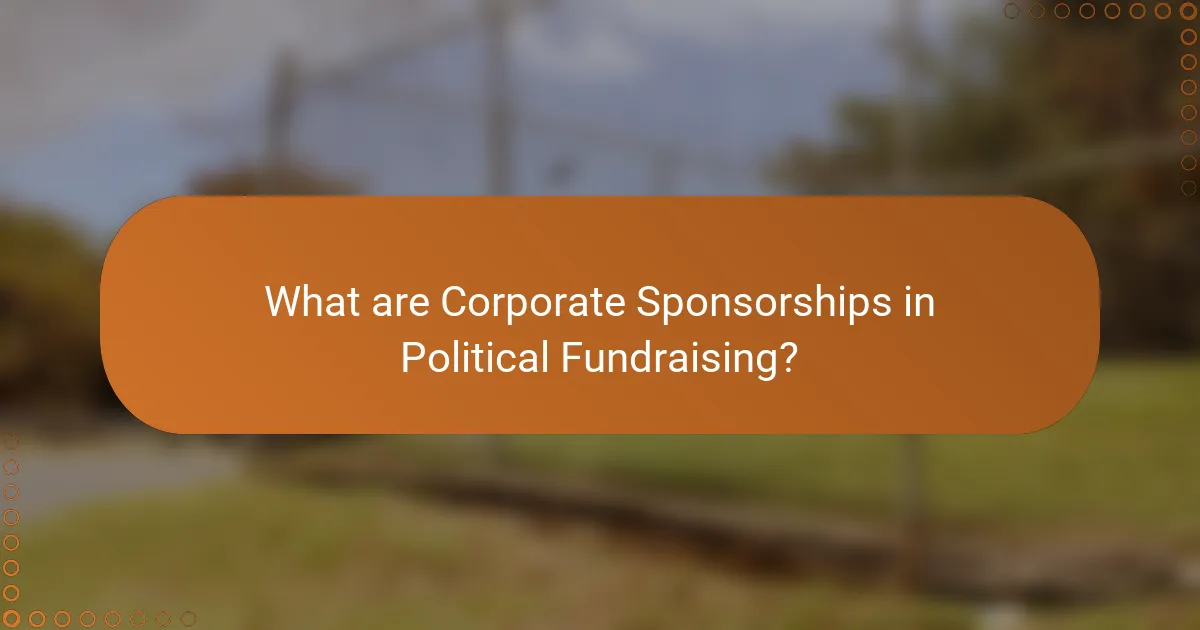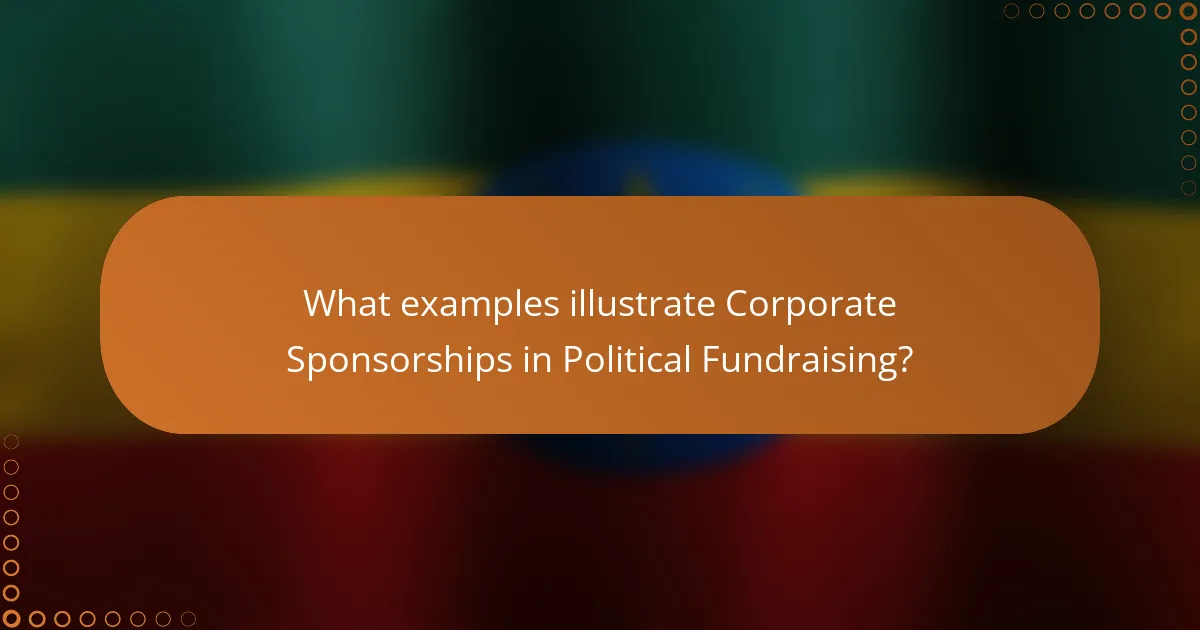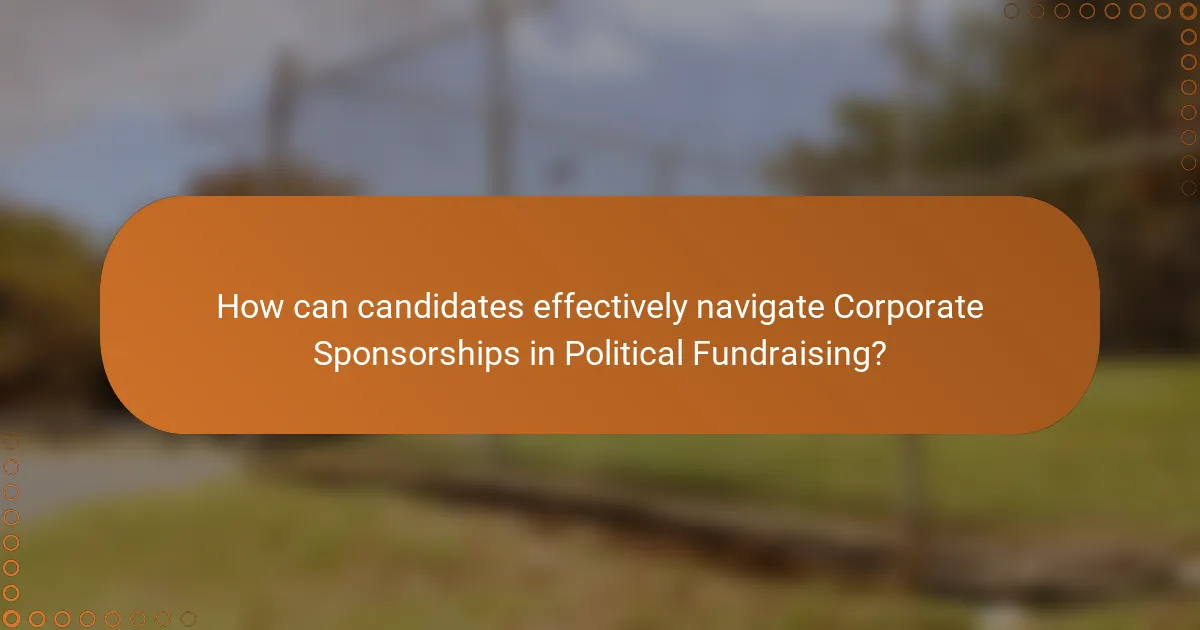Corporate sponsorships in political fundraising involve financial contributions from corporations to political campaigns or organizations, significantly influencing election outcomes. These sponsorships, regulated by laws requiring disclosure, can provide candidates with essential resources while raising ethical concerns about corporate interests potentially overshadowing public interests. Notable examples include the Koch brothers’ support for conservative candidates and the NRA’s funding for pro-gun candidates. Candidates can optimize corporate sponsorships by aligning with corporate values, maintaining transparency, and monitoring public perception to ensure effective fundraising strategies.

What are Corporate Sponsorships in Political Fundraising?
Corporate sponsorships in political fundraising refer to financial contributions made by corporations to political campaigns or organizations. These sponsorships can help candidates finance their campaigns and reach a wider audience. Corporations often seek to align their brand with specific political messages or candidates. In the United States, this practice is regulated by laws that require disclosure of corporate contributions. The Federal Election Commission oversees these regulations to ensure transparency. Research indicates that corporate sponsorships can significantly impact election outcomes by providing necessary resources. This influence raises ethical questions about the potential for corporate interests to overshadow public interests in politics.
How do Corporate Sponsorships function within Political Fundraising?
Corporate sponsorships function within political fundraising by providing financial support to candidates or political organizations. This funding can help cover campaign costs such as advertising, events, and outreach efforts. In return, sponsors often seek visibility and influence in political decisions. This relationship can enhance the sponsor’s brand image and align them with specific political agendas. For instance, companies may sponsor political events to gain access to key decision-makers. According to the Center for Responsive Politics, corporate contributions significantly impact election outcomes. This underscores the importance of corporate sponsorships in shaping political landscapes.
What roles do corporations play in Political Fundraising?
Corporations play significant roles in political fundraising by providing financial support to candidates and political parties. They often do this through political action committees (PACs), which collect contributions from employees and donate to campaigns. In 2020, corporate PACs contributed over $500 million to federal candidates. Corporations also engage in direct donations, influencing political agendas that align with their business interests. Additionally, they sponsor events and initiatives that promote political candidates. This involvement can enhance corporate reputation and foster relationships with policymakers. However, it raises concerns about transparency and potential conflicts of interest in governance.
How do Corporate Sponsorships influence political campaigns?
Corporate sponsorships significantly influence political campaigns by providing substantial financial resources. These funds can enhance a campaign’s visibility and outreach efforts. Corporations often align their sponsorship with candidates who support their interests. This alignment can lead to favorable legislation or policies for the sponsoring companies. Research indicates that candidates receiving corporate donations often prioritize corporate interests in their agendas. For instance, a study by the Center for Responsive Politics found that corporations contributed over $2.5 billion to federal candidates in the 2020 election cycle. Thus, corporate sponsorships create a direct link between financial support and political influence.
What are the potential benefits of Corporate Sponsorships in Political Fundraising?
Corporate sponsorships in political fundraising provide significant financial support to campaigns. They enhance a candidate’s visibility and credibility. Corporations can leverage their brand influence to attract more donations. This financial backing often allows for more extensive outreach efforts. Additionally, corporate sponsorships can facilitate connections with key stakeholders. They can also help candidates access exclusive events and networking opportunities. Studies show that campaigns with corporate sponsorships tend to have higher fundraising totals. This trend underscores the strategic advantage of aligning with influential brands in the political arena.
How can Corporate Sponsorships enhance campaign visibility?
Corporate sponsorships enhance campaign visibility by increasing brand exposure and credibility. Sponsorships provide financial support that allows campaigns to reach a wider audience through advertising and events. For instance, campaigns can utilize sponsored events to attract media attention and engage the public. This leads to greater awareness of campaign messages and goals. According to a study by the Harvard Business Review, campaigns with corporate sponsorships can see a 30% increase in visibility compared to those without. Additionally, sponsors often promote their association with the campaign across their own channels, further amplifying reach.
What financial advantages do candidates gain from Corporate Sponsorships?
Candidates gain financial advantages from corporate sponsorships through increased funding for their campaigns. Corporate sponsorships provide significant monetary contributions that can enhance a candidate’s financial resources. These funds can be used for advertising, outreach, and campaign events. Additionally, corporate sponsors often lend their networks to candidates, amplifying fundraising opportunities. This can lead to greater visibility and support among potential voters. According to the Center for Responsive Politics, candidates who secure corporate sponsorships often raise 50% more than those who do not. This financial backing can be crucial in competitive elections, allowing candidates to reach broader audiences.
What risks are associated with Corporate Sponsorships in Political Fundraising?
Corporate sponsorships in political fundraising carry several risks. One significant risk is the potential for reputational damage. If a corporation is linked to controversial political actions, it may face backlash from consumers and stakeholders. Another risk involves regulatory scrutiny. Corporate contributions can attract attention from regulatory bodies, leading to investigations or penalties. Additionally, there is a risk of alienating constituents. Voters may perceive corporate sponsorship as undue influence over political decisions. Conflicts of interest can also arise, where corporate interests may not align with public welfare. Lastly, transparency issues can emerge. Lack of clarity about sponsorships can lead to distrust in political processes. These risks highlight the complexities involved in corporate sponsorships within political fundraising.
How can Corporate Sponsorships affect public perception of candidates?
Corporate sponsorships can significantly influence public perception of candidates. Candidates associated with reputable corporations may be viewed as trustworthy and credible. This association can enhance their image and increase voter support. Conversely, sponsorships from controversial companies can lead to public skepticism. Voters may question a candidate’s integrity if they are linked to unethical business practices. Research indicates that candidates receiving corporate support often experience shifts in approval ratings. A study by the Center for Responsive Politics found that candidates with substantial corporate backing tend to attract more media attention. This increased visibility can shape voter opinions positively or negatively, depending on the corporation’s public image.
What legal implications should candidates consider with Corporate Sponsorships?
Candidates should consider compliance with campaign finance laws when engaging in corporate sponsorships. These laws regulate contributions and expenditures to ensure transparency. Violating these laws can result in penalties or legal action. Candidates must also be aware of disclosure requirements related to sponsorship agreements. Failure to disclose corporate sponsorships may lead to accusations of unethical behavior. Additionally, candidates should evaluate the potential influence of corporate sponsorships on their policies. This influence may raise concerns about conflicts of interest. Understanding these legal implications is crucial for maintaining integrity and public trust.

What examples illustrate Corporate Sponsorships in Political Fundraising?
Corporate sponsorships in political fundraising include notable examples such as the Koch brothers’ support for conservative candidates. They have contributed millions to various political action committees. Another example is the National Rifle Association (NRA), which receives funding from corporate sponsors to support pro-gun candidates. In 2020, the NRA spent over $20 million on political campaigns. Additionally, companies like AT&T have engaged in sponsorships for political events, influencing legislative agendas. These examples demonstrate the significant financial impact corporate sponsorships can have on political fundraising efforts.
What notable case studies highlight Corporate Sponsorships in action?
Notable case studies that highlight corporate sponsorships in action include the partnership between Coca-Cola and the Olympic Games. Coca-Cola has been a key sponsor since 1928, leveraging the global platform to enhance brand visibility. Another example is the sponsorship of the NFL by Anheuser-Busch, which has been ongoing for decades. This partnership allows the company to reach millions of fans each season. Additionally, the collaboration between Microsoft and the NFL for technology integration showcases corporate sponsorship’s impact on enhancing fan experience. These case studies illustrate how corporations strategically align with major events to strengthen their brand presence and engage with target audiences.
How did specific campaigns leverage Corporate Sponsorships successfully?
Specific campaigns successfully leveraged corporate sponsorships by aligning brand values with campaign messages. For example, the 2008 Obama campaign partnered with companies like Starbucks, which shared a focus on community engagement. This partnership enhanced brand visibility and increased fundraising through co-branded events. Additionally, the campaign utilized social media to promote these sponsorships, reaching a broader audience. The integration of corporate sponsors provided financial resources that were critical for outreach efforts. According to a study by the Center for Responsive Politics, campaigns that utilized corporate sponsorships saw a 20% increase in overall donations. This data underscores the effectiveness of strategic partnerships in political fundraising.
What lessons can be learned from failed Corporate Sponsorships in Political Fundraising?
Failed corporate sponsorships in political fundraising highlight critical lessons. Transparency is vital; undisclosed sponsorships can damage credibility. Aligning values between corporations and candidates is essential for authenticity. Misjudging public sentiment can lead to backlash, as seen with companies facing boycotts. Legal compliance is crucial; violations can result in penalties and reputational harm. Effective communication strategies can mitigate negative impacts. Understanding the target audience’s perspective is necessary for successful partnerships. These lessons underscore the importance of strategic alignment and ethical considerations in corporate sponsorships.
How do different industries engage in Corporate Sponsorships for Political Fundraising?
Different industries engage in corporate sponsorships for political fundraising by providing financial support to political candidates and parties in exchange for favorable policies. The technology sector often sponsors campaigns to influence regulations that affect innovation and data privacy. The healthcare industry frequently supports candidates who advocate for healthcare reform, seeking to shape legislation that impacts their business. Energy companies invest in political sponsorships to promote policies favorable to their operations, such as tax incentives for renewable energy. Financial services firms often contribute to political campaigns to ensure a stable regulatory environment. These sponsorships can take the form of direct contributions, event sponsorships, or funding political action committees (PACs). According to the Center for Responsive Politics, in the 2020 election cycle, corporate PACs contributed over $1 billion to candidates and parties. This financial influence can significantly affect political agendas and decision-making processes.
What industries are most active in Corporate Sponsorships for politics?
The industries most active in corporate sponsorships for politics include technology, finance, healthcare, and energy. Technology companies often fund political campaigns to influence regulations and policies affecting their industry. Financial institutions contribute significantly to political sponsorships to shape economic policies. Healthcare firms engage in sponsorships to advocate for legislation that benefits their interests. The energy sector invests in political sponsorships to promote favorable energy policies and regulations. These industries leverage corporate sponsorships as a strategy to gain access to policymakers and influence legislative outcomes.
How do industry-specific factors influence Corporate Sponsorship strategies?
Industry-specific factors significantly influence Corporate Sponsorship strategies. Different industries have unique characteristics that shape sponsorship opportunities and approaches. For instance, the technology sector often focuses on innovation and digital engagement. This leads to sponsorships that leverage online platforms and tech-related events. In contrast, the sports industry emphasizes physical presence and fan engagement. Sponsorships here typically involve events, teams, and athletes to maximize visibility.
Additionally, regulatory environments impact sponsorship strategies. Industries like alcohol and tobacco face stricter regulations, limiting their sponsorship options. This necessitates creative approaches to align with compliance while still reaching target audiences. Conversely, industries such as finance may prioritize credibility and reputation, leading to sponsorships that highlight stability and trustworthiness.
Market trends also dictate sponsorship strategies. For example, the rise of sustainability has prompted companies in various sectors to align with eco-friendly initiatives. This trend influences sponsorship decisions, as businesses seek to enhance their brand image through responsible partnerships.
Overall, industry-specific factors create a framework that shapes how companies approach Corporate Sponsorships. These factors include industry characteristics, regulatory constraints, and market trends, all of which guide strategic decisions.

How can candidates effectively navigate Corporate Sponsorships in Political Fundraising?
Candidates can effectively navigate corporate sponsorships in political fundraising by establishing clear communication and alignment with corporate values. They should identify potential sponsors whose interests align with their campaign goals. Building relationships through networking events and industry conferences can facilitate these connections. Transparency about funding sources is essential to maintain voter trust. Candidates must comply with legal regulations regarding corporate contributions. Monitoring public perception of corporate sponsors is crucial to avoid backlash. Engaging in meaningful dialogue with sponsors can lead to mutually beneficial partnerships. Tracking the impact of sponsorships on campaign success can inform future fundraising strategies.
What best practices should candidates follow when seeking Corporate Sponsorships?
Candidates seeking corporate sponsorships should prioritize building relationships with potential sponsors. Establishing a clear value proposition is crucial. Candidates must articulate how the sponsorship aligns with the sponsor’s goals. Researching the sponsor’s past sponsorships can provide insights into their interests. Tailoring proposals to address the specific needs of the sponsor increases the chances of success. Transparency about campaign goals and funding needs fosters trust. Following up with sponsors after initial contact shows commitment. Demonstrating accountability by reporting on the impact of sponsorship can encourage future partnerships. According to a study by the Harvard Business Review, personalized approaches significantly enhance engagement rates in sponsorship negotiations.
How can candidates build mutually beneficial relationships with corporate sponsors?
Candidates can build mutually beneficial relationships with corporate sponsors by aligning their goals and values. Understanding the sponsor’s objectives is crucial. Candidates should communicate how their campaign aligns with the sponsor’s brand mission. Offering visibility through events and media can attract sponsors. Providing data on audience reach enhances value for sponsors. Engaging in joint initiatives fosters collaboration and trust. Regular communication maintains the relationship and addresses concerns. Transparency about campaign finances reassures sponsors about their investment. These strategies create a foundation for long-term partnerships.
What strategies can candidates implement to mitigate risks associated with Corporate Sponsorships?
Candidates can implement several strategies to mitigate risks associated with corporate sponsorships. First, they should conduct thorough due diligence on potential sponsors. This involves researching the sponsor’s reputation, values, and past controversies. Second, candidates can establish clear contractual agreements that outline expectations and responsibilities. These contracts should specify the nature of the sponsorship and any limitations on influence. Third, transparency is crucial; candidates should disclose sponsorships to the public to maintain trust. Fourth, candidates can diversify their funding sources to reduce dependency on any single sponsor. This approach minimizes the impact of any negative association with a particular sponsor. Lastly, candidates should develop a crisis management plan in case issues arise. This plan should include communication strategies to address potential backlash. These strategies collectively help candidates navigate the complexities of corporate sponsorships while safeguarding their integrity and public image.
Corporate sponsorships in political fundraising involve financial contributions from corporations to political campaigns and organizations, significantly impacting election outcomes and shaping political landscapes. This article examines the functions and roles of corporate sponsorships, their influence on political campaigns, and the financial advantages they offer candidates. It also highlights the potential risks associated with corporate sponsorships, such as reputational damage and regulatory scrutiny, while providing examples and case studies that illustrate their effectiveness. Additionally, best practices for candidates navigating corporate sponsorships are discussed, emphasizing the importance of transparency and alignment of values.
